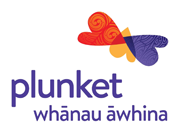Royal New Zealand Plunket Society
 |
|
| Motto | Together, the best start for every child. Mā te mahi ngātahi, e puāwai ai ā tātou tamariki. |
|---|---|
| Formation | 14 May 1907 |
| Type | Incorporated society |
| Website | http://www.plunket.org.nz/ |
The Royal New Zealand Plunket Society is an incorporated society in New Zealand that provides a range of free health services to children under the age of five with their development, health and wellbeing. The Plunket Society mission is "to ensure that New Zealand children are among the healthiest in the world". A lot of Plunket's work is organised by volunteer bases all around New Zealand. There are many different ways to get involved in the Plunket Society.
The society is most commonly referred to in the community as "Plunket".
With the motivation to form a 'society' that would 'help mothers and save babies', Dr Frederic Truby King worked on an article focusing on child welfare. A meeting, which led to the founding of the society, was held on 14 May 1907, in Dunedin, by Truby King. King was a medical superintendent and lecturer in mental diseases. He believed that by providing support services to parents, the society could ensure children were fed on a nutritious diet, reducing child mortality rates. He also believed that this would improve adult health as the children got older.
Originally called the Society for the Health of Women and Children, the society gained royal recognition and the prefix Royal in 1915. Plunket's name derives from an early patron of the Society, Victoria Alexandrina Plunket, mother of eight and wife of then Governor of New Zealand, William Plunket, 5th Baron Plunket.
Later that year, the society first opened The Karitane Home For Babies in Dunedin, and then opened centres in Auckland, Wellington, and Christchurch. These centres were used for both training camps for the nurses and for the babies that were failing to flourish.
The society laboured for many years under the false perception that it was set up to cater only for European women and their babies; this impression was reinforced by the fact that the Department of Health operated a Native Health Nurse Service specifically for Maori in rural areas.
...
Wikipedia
